CRJ 14:1 is out now!
Our latest issue is now hot off the press and, depending on the postal services over the festive season, will be arriving in mailboxes soon. If you don't yet subscribe, this is what's coming up... Subscribe now to make sure you don't miss out!
BCM & Resilience
David Rubens was recently asked to review 2018 and look forward to 2019 at an event. He says that 2018 has been a challenging year and, for anyone involved in any aspect of security, risk and business continuity management, it doesn’t look like the world is going to get any better any time soon
Turbulent times
Like it or loathe it, Brexit creates an opportunity to engage organisations in establishing, developing and testing their resilience, according to David Evans
Social media signals to monitor risk
Machine learning and artificial intelligence can provide immediate situational awareness, says Key Network Partner, Dataminr
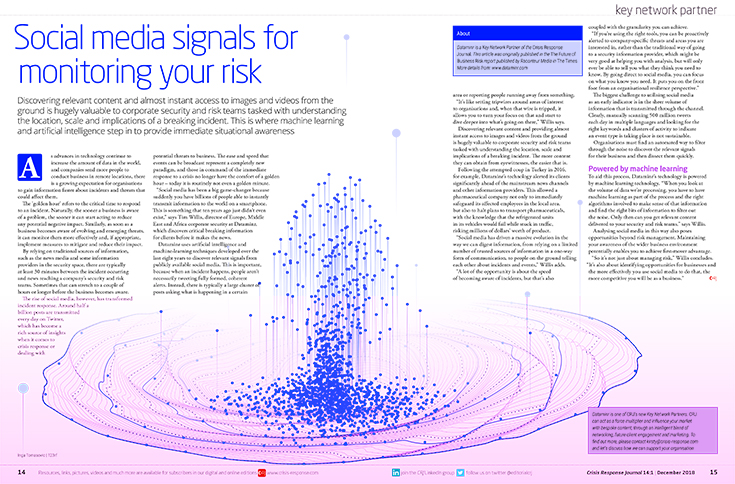
Insider threats
How can we improve informed awareness and hedge against high consequence, low probability events such as insider threat breaches? Josh Kurjan investigates
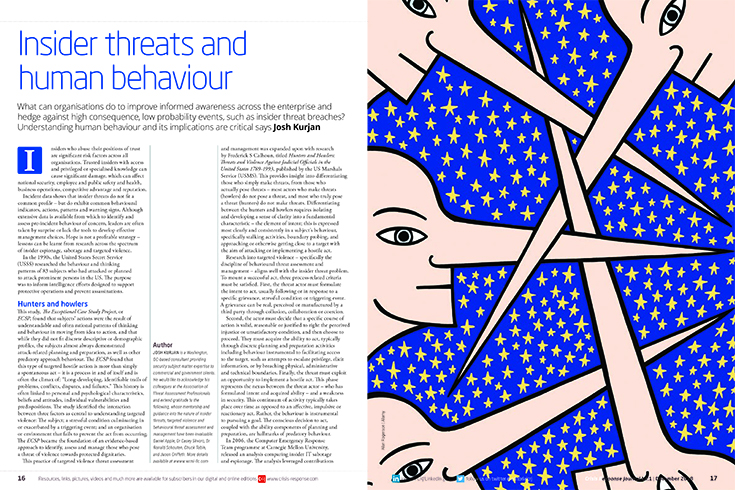
Realistic rehearsals
Key Network Partner Conducttr develops technology and methodology for clients to write and run their own realistic crisis exercises, writes Robert Pratten
Contextual awareness
Today’s massive influx of data is changing the anatomy of technology in business and the landscape in which organisations operate, says David Prior of Resilio, a CRJ Key Network Partner
Incident & Safety Analysis
The Morandi Bridge collapse
Luigi D’Angelo, Operational Manager, Emergency Management, with the Italian Civil Defence Department, describes the operational search and rescue efforts after a bridge collapsed in Genoa, plunging vehicles to the ground and killing dozens of people
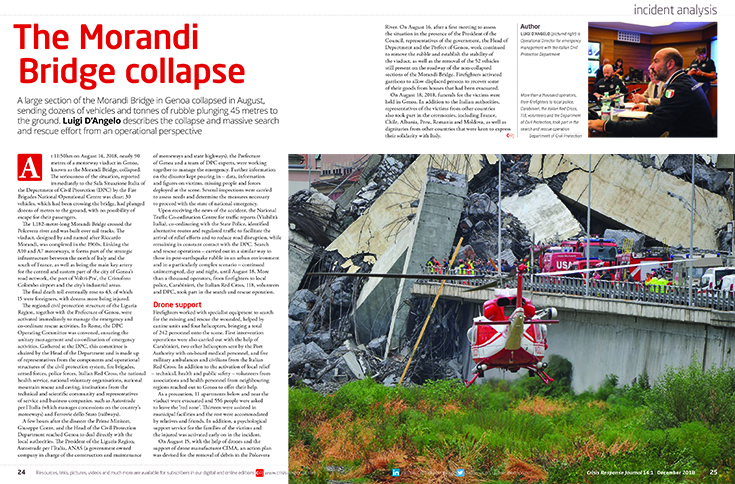
Hurricane Florence
Frank Blackley, Assistant Chief at Wilmington Fire Department, outlines preparations taken ahead of Hurricane Florence striking Wilmington, North Carolina, this August
Misinformation and fake news
The fallout from one of Russia’s deadliest fires in modern history was intensified by mistrust and lack of effective communication, says Lina Kolesnikova
The evolution of smoke detectors
The time people have to exit a burning building has been decreased with the advent of modern, synthetic materials, according to Key Network Partner, Underwriters Laboratories
Security & Counter-terrorism
The tip of the spear against terror
Robert McAlister and Naser Arabyat take a look at what’s on offer at the King Abdullah II Special Operations Training Centre in Jordan
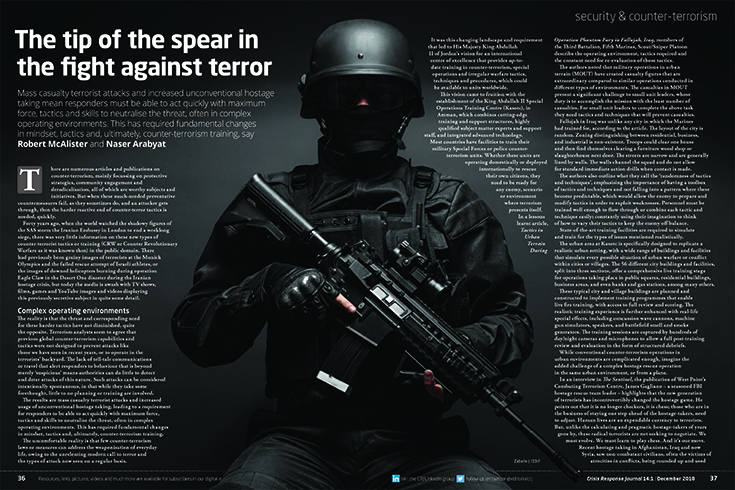
Assessing the current al-Qaeda threat
A report from the Analytical Support and Sanctions Monitoring Team was delivered to the United Nations Security Council in July, offering a stark reminder that al-Qaeda remains a serious threat around the world, reports Roger Gomm
Hybrid threats
Can a natural disaster be a hybrid threat? What is the role of the military after disasters? How do disasters influence states, especially fragile ones? Alois Hirschmugl investigates
Environmental issues in hybrid warfare
Four years of conflict in eastern Ukraine have led to thousands of deaths, and the effects on the environment and infrastructure are threatening thousands more people, says Serhii Ivaniuta
Natural events
Civil-military co-ordination
David P Polatty and Ronak Patel explore how urbanisation and climate change will dominate the future of humanitarian action and present a new landscape for militaries and civilian organisations
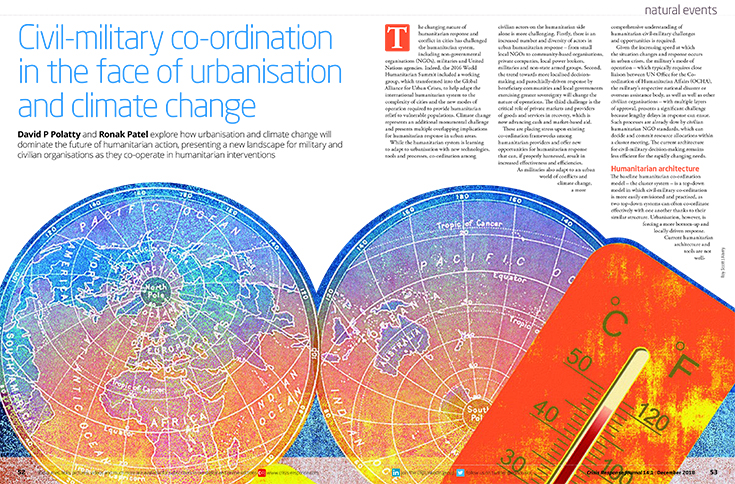
Climate resilience in Europe
Rosalind Cook, Sirkku Juhola and Jaroslav Mysiak say we have a window of opportunity to deliver a safe and sustainable world, but we must act now
Wildfires in Canada
Landscape fires are likely to become an increasingly significant source of carbon dioxide emissions, not to mention the damaging cascading effects they have upon communities, warn Casey Brunelle and Joseph Satenstein
Air coalition in Indonesia
Chris Weeks reports on how a coalition of eight nations provided emergency air freight services for humanitarian aid after October’s earthquake and tsunami in Central Sulawesi, Indonesia
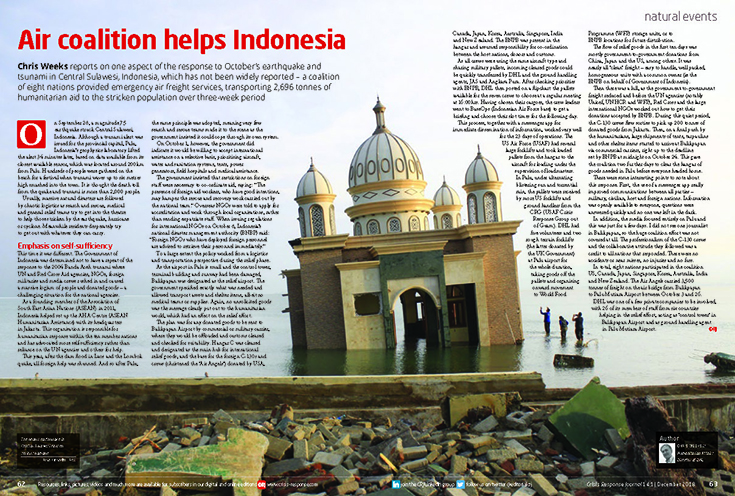
Moving humanitarian air cargo
Key Network Partner Volga-Dnepr Airlines is often first on the ground with urgently needed humanitarian aid
Community & Societal
Zero-responders: A force multiplier?
Chris Cocking explores Lord Kerslake’s recommendations after the Manchester Arena bomb attack of 2017 as they relate to the concept of zero-responders – in other words, members of the public who are first on scene at an incident
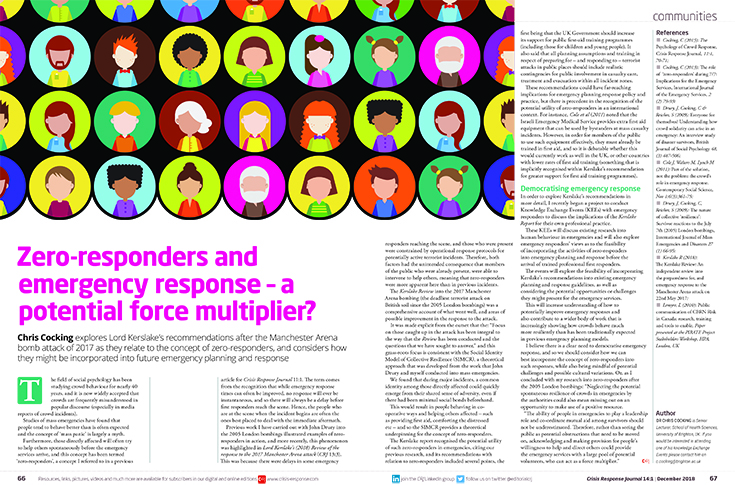
Community Emergency Response Teams
Local, state and federal government agencies do not have the capacity to help all citizens during all stages of a crisis, and nor should they, according to Robert Fagan. But individuals can prepare to cope during the critical period before first responders may be available
Promoting recovery
Bernice George and Rebecca Sundhu explore how first aid can promote growth and recovery in school staff following a critical incident
Minecraft and Lego for DRR
Children are often ignored when developing disaster risk reduction policies, yet their participation is an essential element for safer communities. Three researchers from New Zealand describe a project that builds children’s resilience through play
Innovation for resilience
How can societies become more resilient in the face of ever more threatening disasters? João Dias describes a European project that aims to help
Managing a three-year emergency
Cordula Dittmer and Daniel F Lorenz examine how European instruments and budgets have been adapted to provide long term humanitarian assistance within EU territory
Setting fire to buildings
David Rush brings details of a research project looking into the complex dynamics of informal settlements and fire safety
Helping those displaced by Boko Haram
Andrew Brown gives a personal perspective on safety and security of humanitarian personnel, based on a recent visit to north-east Nigeria
R&D
Humans first in the digital age
Can digitisation revolutionise the way we deliver aid, or are we at risk of dehumanising the sector? Anastasia Kyriacou investigates
Situational awareness
FirstNet gives emergency managers greater access to real time information than ever before. Charles Murph says that it is now time to think about how to manage the ever larger volumes of data that will ensue
Drones and public safety
Some consider the absence of a public safety programme to be dangerous and even negligent, contends Charles L Werner, because it means that incident commanders are not getting a vital three-dimensional view of incidents

Events
Lina Kolesnikova reviews the recent Crans Montana Forum, Lina Kolesnikova chaired a session and facilitated discussions on cyber threats, as well as fake news, cybercrime, decryption and regulations of cryptocurrencies and the development of crypto due diligence. Meanwhile, Brian Dillon reports from the ninth annual Advanced Law Enforcement Rapid Response Training (ALERTT) centre conference in Grapevine, Texas, USA.
Frontline
Project Lifesaver International harnesses new technology help search and locate people with cognitive disorders who become lost. Emily Hough talks to the not-for-profit's founder, Gene Saunders, a retired captain from Chesapeake VA Police Department
For more details on how to subcribe, contact Kirsty McKinlay-Stewart, or click here